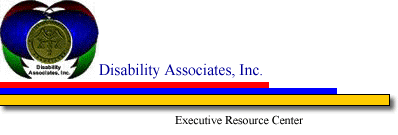
| Ask a Question | All Categories | Products |
Operations List of Categories
Page 1 Page 2
Page 3
Page 4 Page
5
- Are there any other kinds of examinations that SSA might request?
- What if my client is unable to attend
a scheduled CE?
- On reconsideration, should I pursue additional evidence?
- What if the additional evidence on appeal hurts the case?
- When should I request an appeal of a denial decision?
- Should I wait until the client is denied at least once before I enter the case?
- If I or the claimant pays for a consultative exam, will SSA reimburse us?
- My client
received a notice saying that he is not eligible for SSI. What does this mean to the case?
- Are there any other kinds of examinations that SSA might request?
Oh, yes! Social Security can request laboratory test, X-rays, psychological examinations, IQ tests, pulmonary function studies, workshop evaluations and more.
To top
- What if my client is unable
to attend a scheduled CE?
If the claimant is unable or too sick to attend an examination, let SSA know about this in writing prior to the examination. The earlier you notify SSA of the situation, the more likely SSA will work with you.
To top
- On reconsideration, should
I pursue additional evidence?
Yes! It is not uncommon for a person applying for reconsideration to have additional evidence that was generated during or after the last SSA decision. You should request this evidence in all instances, even if you don't think it will help the case.
To top
- What if the additional
evidence on appeal hurts the case?
If new or additional evidence on appeal hurts the case, see if you can explain away the results in the appeal argument. It's also a good idea to see if the claimant's attending physician would be willing to provide statements that would help you to reduce the importance any damaging additional evidence. This can be accomplished by sending the client's attending physician (AP) a questionnaire that contradicts the findings of the additional evidence.Example: Additional evidence indicates that the claimant can do sedentary work. To counter this, send the claimant's AP a five (not more than 10) question questionnaire. In the questionnaire, use leading questions.
Example: Dear AP, Claimant is suffering from diabetic neuropathy and is alleging an inability to stand and walk for more than 1 hour a day. Given the claimant's diabetic condition, do you feel it is reasonable to limit standing and walking to less than one hour per day? Make sure your questionnaire only contains yes-no choices for the AP. Yes or no responses are easy for the doctor and increase the likelihood that he will respond. Offer to pay for the report if need be.
To top
- When should I request an appeal of a denial decision?
You should appeal a previous denial decision within sixty day of receiving the denial notice.
To top
- Should I wait until the client is denied at least once before I enter the case?
You most certainly can use this approach if you wish. The advantage of waiting until appeal is that much of the case development will have already been completed.
To top
- If I or the claimant pay for a consultative exam, will SSA reimburse us?
If Social Security requests the additional examination, then yes, Social Security will reimburse you or the client for this expense. However, if the claimant simply goes to a medical source on his own, Social Security will not pay for the treatment or the examination.
To top
- My client
received a notice saying that he is not eligible for SSI.
What does this mean to the case?
It is not unusual for a person to apply for both SSI and SSDI at the same time. Upon review by Social Security, it may be determined that the client has enough income or resources to make him ineligible for SSI. The claimant can still continue to apply for SSDI in this situation. If the claimant is found to have income above SGA at the time of application, he may also be found ineligible to apply for SSDI. Until you receive a notice indicating that the claimant is ineligible for SSI or SSDI, you would continue to pursue the claim as usual.
To top
Copyright © 2007 - 2012. Disability Associates, Inc. All Rights Reserved.